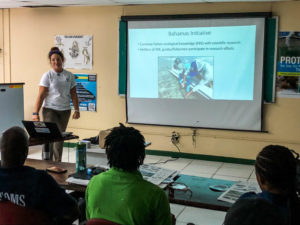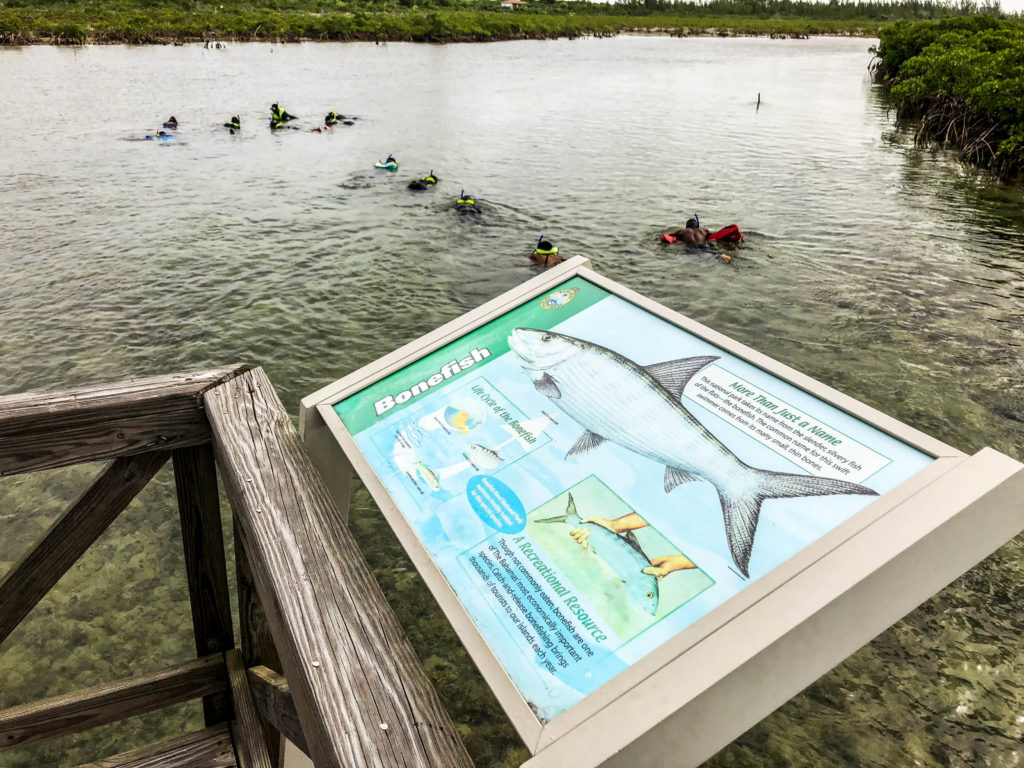On June 18 – 21, Bahamas Initiative Manager Justin Lewis and intern Nina Sanchez represented Bonefish & Tarpon Trust at the second annual Bahamas Reef Environment Educational Foundation (BREEF) and Royal Bahamas Defense Force Marine (RBDF) Conservation Workshop, sponsored by BTT. The workshop, held at the Royal Bahamas Defense Force base in Coral Harbor, featured a combination of classroom activities and lessons, as well as a variety of field trips focused on marine conservation. The participants included customs, police, and defense force officers, as well as representatives from the Prime Minister’s office.
The workshop was based on a simple but effective model: a classroom lecture paired with a field trip that complemented the day’s lesson and enhanced the participants’ understanding of marine biology and ecology in the Bahamas. Many commented on how much more impactful the information taught in the classroom became after they had seen the ecosystems and organisms firsthand.
On one such field trip, the participants had the opportunity to explore and snorkel in the mangrove ecosystem of Bonefish Pond National Park, a 1,235-acre protected coastal wetland area that serves as important bonefish habitat. This national park acts as the perfect outdoor classroom, as it allows visitors to view the mangrove ecosystem from a boardwalk as well as through a snorkeling mask. In an interactive boardwalk hike, participants learned about the function of mangroves and the vital role they play. While on the hike, Justin pointed out the telltale signs of bonefish, such as feeding holes, and described what makes an ideal bonefish habitat.
The participants then snorkeled through the mangroves, where they had the chance to put their newly acquired knowledge to the test. They identified species of fish, sponges, and algae such as Laurencia, which is a key feature of healthy bonefish habitat. Some of the more adventurous participants went for a wade through the creek at Bonefish Pond with Justin. As the tide was falling, the participants were able to see a few schools of bonefish pushing out of the creek. The group made several observations about the bonefish habitat and quickly noticed how the water temperature varies drastically in mangrove systems, giving Justin the opportunity to explain to them the many environmental factors that affect bonefish.
Before the field trip to Bonefish Pond National Park, Justin gave a presentation on the role of BTT and explained the Bahamas Initiative. He reviewed bonefish anatomy and their ecological significance and emphasized how important healthy habitat is for bonefish. Justin’s presentation also included information about bonefish reproduction and the interconnectivity of bonefish populations in terms of spawning sites, which many participants found fascinating. He concluded his presentation by showing BTT’s best bonefish handling practices video.
Afterwards, Nina told the participants about BTT’s tagging work in the Bahamas and explained how the research revealed that bonefish have small home ranges that require protection. The participants were also surprised to learn how sensitive bonefish are to anthropogenic threats. Nina went on to discuss the role of citizen science and how fishermen’s ecological knowledge (FEK) is vital to the successful conservation of bonefish. Participants began to understand that although fishermen and conservation organizations often have the same goal of conserving the fishery, collaboration between these stakeholders can be difficult, but is absolutely necessary. BTT’s collaboration with these groups has helped bridge the gap and brought stakeholders together to work towards the common goal of conserving bonefish and flats habitat.
The 2019 BREEF and RBDF Marine Conservation Workshop demonstrated how important it is for law enforcement to work with conservation organizations. When enforcement officers are given the opportunity to enhance their understanding of local fishery regulations and the ecology of marine ecosystems, they can undoubtedly better protect them. With this new knowledge, participants will be able to reduce the number of fishery violations that occur in Bahamian waters and allow species like bonefish to thrive.




